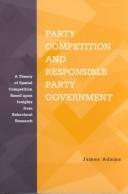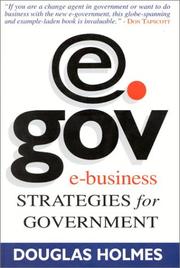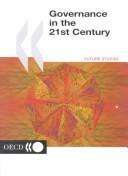| Listing 1 - 8 of 8 |
Sort by
|
Book
ISBN: 9052426414 Year: 2001 Publisher: Den Haag : Landbouw-economisch instituut,
Abstract | Keywords | Export | Availability | Bookmark
 Loading...
Loading...Choose an application
- Reference Manager
- EndNote
- RefWorks (Direct export to RefWorks)

ISBN: 1282703560 9786612703560 0472027182 9780472027187 0472087673 9780472087679 0472112015 9780472112012 0472087673 9780472087679 9781282703568 6612703563 Year: 2001 Publisher: Ann Arbor, MI : ©2001 University of Michigan Press,
Abstract | Keywords | Export | Availability | Bookmark
 Loading...
Loading...Choose an application
- Reference Manager
- EndNote
- RefWorks (Direct export to RefWorks)
In countries with multiparty political systems, we assume--if the system is going to work--that parties have relatively stable positions on policy, that these positions diverge, and that voters make choices based on policy preferences. Yet much of the research on voter behavior and party competition does not support these assumptions. In Party Competition, James Adams applies the insights of behavioral research to an examination of the policy strategies that political parties (and candidates) employ in seeking election. He argues that vote-seeking parties are motivated to present policies that appeal to voters, whose bias toward these policies is based in part on reasons that have nothing to do with policy. He demonstrates that this strategic logic has profound implications for party competition and responsible party government. Adams's innovative fusion of research methodologies presents solutions to issues of policy stability and voter partisanship. His theory's supported by an in-depth analysis of empirical applications to party competition in Britain, France, and the United States in the postwar years. Party Competition and Responsible Party Government will appeal to readers interested in the study of political parties, voting behavior and elections, as well as to scholars specializing in French, British, and American politics.
Political parties. --- Democracy. --- Voting research. --- POLITICAL SCIENCE --- Political Process / Political Parties --- Government - General --- Law, Politics & Government --- Political Institutions & Public Administration - General --- Voting --- Voting behavior research --- Elections --- Self-government --- Political science --- Equality --- Representative government and representation --- Republics --- Parties, Political --- Party systems, Political --- Political party systems --- Divided government --- Intra-party disagreements (Political parties) --- Political conventions --- Research

ISBN: 0521793238 0521797306 0511016956 0511047266 0511174357 1280433027 051115416X 0511328281 0511491107 110712218X 9780511016950 9780511154164 9780521793230 9780511491108 9786610433025 661043302X 9780521797306 9780511047268 9780511174353 9781280433023 9780511328282 Year: 2001 Publisher: Cambridge, UK ; New York : Cambridge University Press,
Abstract | Keywords | Export | Availability | Bookmark
 Loading...
Loading...Choose an application
- Reference Manager
- EndNote
- RefWorks (Direct export to RefWorks)
Democracy is inherently difficult in societies divided along deep ethnic cleavages. Elections in such societies will often encourage 'centrifugal' politics which reward extremist ethnic appeals, zero-sum political behaviour and ethnic conflict, and which consequently often lead to the breakdown of democracy. Reilly examines the potential of 'electoral engineering' as a mechanism of conflict management in divided societies. He focuses on the little-known experience of a number of divided societies which have used preferential, vote-pooling electoral systems - such as Papua New Guinea, Sri Lanka, Northern Ireland and Fiji. Examination of these cases shows that electoral systems which encourage bargaining between rival political actors, which promote the development of broad-based, aggregative political parties and which present campaigning politicians with incentives to attract votes from a range of ethnic groups can, under certain conditions, encourage the development of moderate, accommodatory political competition in divided societies.
Political systems --- Elections --- Conflict management --- Gestion des conflits --- Conflict management. --- Democracy. --- Democracy - Case studies. --- Elections. --- Government - General --- Law, Politics & Government --- Political Institutions & Public Administration - General --- Democracy --- #SBIB:014.AANKOOP --- #SBIB:324H42 --- #SBIB:324H71 --- Self-government --- Political science --- Equality --- Representative government and representation --- Republics --- Conflict control --- Conflict resolution --- Dispute settlement --- Management of conflict --- Managing conflict --- Management --- Negotiation --- Problem solving --- Social conflict --- Crisis management --- Electoral politics --- Franchise --- Polls --- Politics, Practical --- Plebiscite --- Political campaigns --- Politieke structuren: verkiezingen --- Politieke verandering: modernisatie, democratisering, regional development --- Social Sciences --- Political Science --- Elections - Case studies --- Conflict management - Case studies --- Democracy - Case studies

ISBN: 1280082976 9786610082971 9264195033 9264195297 Year: 2001 Publisher: Paris : OECD Publishing,
Abstract | Keywords | Export | Availability | Bookmark
 Loading...
Loading...Choose an application
- Reference Manager
- EndNote
- RefWorks (Direct export to RefWorks)
In an era of globalisation, decentralisation, and knowledge-based economies, governments are having to reshape public sector leadership to cope with new challenges. This environment requires new roles for public sector leaders including change agents, promoters of enhanced performance, co-ordinators of government policies, and keepers of public service values. Many governments of OECD Member countries are developing new public sector leadership models. This is the first report to examine key leadership issues across OECD Member countries, including the strategies and practices governments are adopting, and the lessons from country experiences so far.
Organizational change. --- Public administration -- Europe. --- Public administration -- Mexico. --- Public administration -- United States. --- Political leadership --- Public administration --- Organizational change --- Civil service reform --- Civil service --- Government - General --- Law, Politics & Government --- Political Institutions & Public Administration - General --- Bureaucrats --- Career government service --- Civil servants --- Government employees --- Government service --- Public employees --- Public service (Civil service) --- Merit system --- Spoils system --- Change, Organizational --- Organization development --- Organizational development --- Organizational innovation --- Administration, Public --- Delivery of government services --- Government services, Delivery of --- Public management --- Public sector management --- Law and legislation --- Legal status, laws, etc. --- Public officers --- Public service employment --- Patronage, Political --- Management --- Organization --- Manpower planning --- Political science --- Administrative law --- Decentralization in government --- Local government --- Leadership --- Administration publique (Science) --- Case studies --- Cas, Etudes de
Book
ISBN: 2760521559 1435687051 9781435687059 9782760521551 2760511219 9782760511217 2760511217 Year: 2001 Publisher: Sainte-Foy, Quebec, Canada : Presses de l'Universite du Quebec,
Abstract | Keywords | Export | Availability | Bookmark
 Loading...
Loading...Choose an application
- Reference Manager
- EndNote
- RefWorks (Direct export to RefWorks)
L'auteur analyse et décrit les appareils de communication gouvernementaux des provinces canadiennes et évalue leur performance et leur efficacité sur le terrain en accordant une attention particulière au gouvernement fédéral et à celui du Québec et en les comparant à ceux du Royaume-Uni et de la France.
Communication in politics -- Canada -- History -- 20th century. --- Communication in politics -- Quebec (Province) -- History -- 20th century. --- Government marketing -- Canada -- History -- 20th century. --- Government marketing -- Quebec (Province) -- History -- 20th century. --- Propaganda -- Quebec (Province) -- History -- 20th century. --- Government marketing --- Communication in politics --- Propaganda --- Government - General --- Law, Politics & Government --- Political Institutions & Public Administration - General --- History --- Administration publique --- Communication politique --- Propagande --- Marketing --- Histoire --- Political communication --- Marketing, Government --- Marketing, Public sector --- Public sector marketing --- Political psychology --- Social influence --- Advertising --- Persuasion (Psychology) --- Psychological warfare --- Public relations --- Publicity --- Social pressure --- Political science

ISBN: 1857882784 Year: 2001 Publisher: London Brealey
Abstract | Keywords | Export | Availability | Bookmark
 Loading...
Loading...Choose an application
- Reference Manager
- EndNote
- RefWorks (Direct export to RefWorks)
#SBIB:024.IO --- #SBIB:35H24 --- #SBIB:35H500 --- #SBIB:324H60 --- #SBIB:309H253 --- Informatiemanagement bij de overheid --- Bestuur en samenleving: algemene werken --- Politieke socialisatie --- Externe communicatie: non-profit-sector --- Internet in public administration. --- Electronic government information. --- Electronic public records. --- Public administration --- Government - General --- Law, Politics & Government --- Political Institutions & Public Administration - General --- Computer network resources. --- Electronic government information --- Electronic public records --- Internet in public administration --- Administration, Public --- Delivery of government services --- Government services, Delivery of --- Public management --- Public sector management --- Digital government --- E-government --- Electronic government --- Online government --- Public records --- Electronic government publications --- Government information --- Computer network resources --- Political science --- Administrative law --- Decentralization in government --- Local government --- Public officers --- Government publications

ISBN: 1280081236 9786610081233 926418936X 9264185410 Year: 2001 Publisher: Paris : OECD Publishing,
Abstract | Keywords | Export | Availability | Bookmark
 Loading...
Loading...Choose an application
- Reference Manager
- EndNote
- RefWorks (Direct export to RefWorks)
As we move into the 21st century, the turbulent transformation of economy and society looks set to continue. Growing integration of markets, radical new technologies, the increasing knowledge intensity of human activity, all point to the emergence of an immensely complex world. But how will it be managed? And by whom? What forms of organisation and decision-making will be required at local, national and global levels to meet the challenges of the next decades? One thing seems certain: old forms of governance -- in the public sector, corporations and civil society -- are becoming increasingly ineffective. New forms of governance will be needed over the next few decades which will involve a much broader range of active players. Traditional hierarchical organisations and top-down control will give way more and more to a wider diffusion of responsibility and decision-making that builds on the talents for innovation and creativity of individuals and groups. This book explores some of the opportunities and risks -- economic, social and technological -- that decision-makers will have to address in the coming years, and outlines what needs to be done to foster society 's capacity to manage its future more flexibly and with broader participation of its citizens.
Political participation -- Congresses. --- Public administration -- Decision making -- Citizen participation -- Congresses. --- Public administration -- Decision making -- Congresses. --- Public administration --- Political participation --- Corporate governance --- Group decision making --- Twenty-first century --- Government - General --- Law, Politics & Government --- Political Institutions & Public Administration - General --- Decision making --- Citizen participation --- Forecasts --- 21st century --- Collective decision making --- Decision-making, Group --- Community action --- Community involvement --- Community participation --- Involvement, Community --- Mass political behavior --- Participation, Citizen --- Participation, Community --- Participation, Political --- Political activity --- Political behavior --- Administration, Public --- Delivery of government services --- Government services, Delivery of --- Public management --- Public sector management --- Third millennium --- Political rights --- Social participation --- Political activists --- Politics, Practical --- Political science --- Administrative law --- Decentralization in government --- Local government --- Public officers --- Economics --- Administration publique (Science) --- Participation politique --- Gouvernement d'entreprise --- Décision de groupe --- Vingt et unième siècle --- Congresses --- Prise de décision --- Congrès --- Prévisions

ISBN: 9264195408 9786610081196 1280081198 9264195572 Year: 2001 Publisher: Paris : OECD,
Abstract | Keywords | Export | Availability | Bookmark
 Loading...
Loading...Choose an application
- Reference Manager
- EndNote
- RefWorks (Direct export to RefWorks)
This handbook offers government officials practical assistance in strengthening relations between government and citizens. It combines a brief review of basic concepts, principles, concrete examples of good practice, tools (including new information and communication technologies) as well as tips from practice. The approach and activities shown in this handbook support and complement formal institutions of democracy, and strengthen the democratic process.
participation --- politique --- information --- communication --- pays de l'ocde --- deelneming --- politiek --- informatie --- communicatie --- oeso landen --- Policy sciences -- Case studies. --- Political participation -- Case studies. --- Public administration -- Citizen participation -- Case studies. --- Public administration -- Citizen participation. --- E-democratie --- 691 Informatiebeleid, Internet --- Burgerparticipatie --- Burgerparticipatie. --- Public administration --- Political participation --- Administration publique (Science) --- Participation politique --- Policy sciences. --- Political participation. --- Policy sciences --- Government - General --- Law, Politics & Government --- Political Institutions & Public Administration - General --- Policy-making --- Policymaking --- Public policy management --- Administration, Public --- Delivery of government services --- Government services, Delivery of --- Public management --- Public sector management --- Political science --- Administrative law --- Decentralization in government --- Local government --- Public officers --- Citizen participation --- Community action --- Community involvement --- Community participation --- Involvement, Community --- Mass political behavior --- Participation, Citizen --- Participation, Community --- Participation, Political --- Political activity --- Political behavior --- Political rights --- Social participation --- Political activists --- Politics, Practical --- 213 Democratie --- E-books --- Sociale bewegingen. --- Citizen participation.
| Listing 1 - 8 of 8 |
Sort by
|

 Search
Search Feedback
Feedback About UniCat
About UniCat  Help
Help News
News